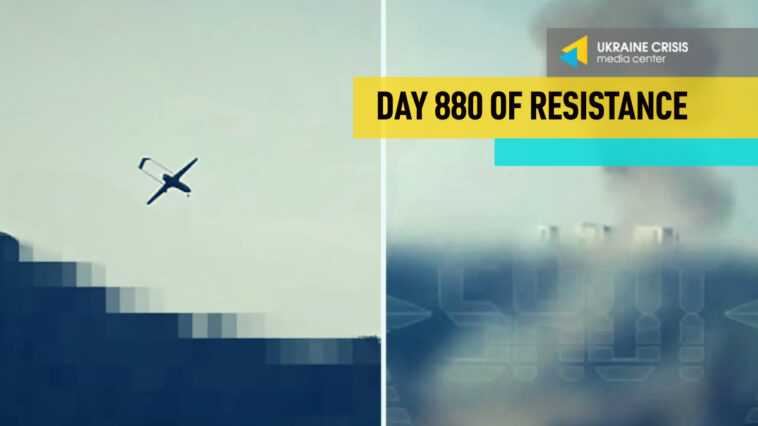Ukrainian drones hit a Russian military airfield and an oil refinery as Russia reports major drone attack. Russia has completely destroyed 214 medical facilities since the invasion. The EU becomes a full-fledged member of the Register of Damage for Ukraine.
Ukrainian drones hit Russian military airfield, oil refinery as Russia reports major drone attack
A swarm of Ukrainian drones attacked several Russian regions overnight on Monday. Drones reportedly hit targets in the Rostov and Krasnodar regions.
Reports and footage circulating on social media appeared to show smoke rising above the Morozovsk military airfield in the Rostov region.
The governor of the Rostov region, Vasily Golubev, said that Russian air defenses shot down 47 drones over the region. Falling debris caused “small brush fires” that were “quickly extinguished,” he added.
The Morozovsk airfield is home to Russian Su-24, Su-24M, and Su-34 bombers. It was previously targeted by Ukrainian drones in April when a joint attack conducted by Ukraine’s Security Service and other units of the Armed Forces destroyed six Russian warplanes and damaged eight others stationed at the air base.
Of the 75 drones launched overnight, Russia’s defense ministry said 47 drones had been downed over the Rostov region, 17 over the waters of the Black Sea, eight over the Krasnodar region, and single drones over the Belgorod, Voronezh and Smolensk regions.
Ukrainian drones attacked the Tuapse oil refinery in the Krasnodar region overnight on Monday, causing a fire at the facility. Ukraine’s defense intelligence was behind the operation, a source in the agency told news outlet The New Voice of Ukraine.
A first wave of drones appeared in the skies over Tuapse at around 3:30 a.m. local time, the source said. Russian air defenses reportedly tried to destroy four drones. Later, at around 6:25 a.m. at least two powerful explosions rocked the area and a fire started on the site.
Russia media said the drone that appeared on a video circulating on social media was shot down, but falling debris hit the refinery.
A total of eight drones attacked the facility. The damage sustained by Russia as a result of the attack is being verified.
The Tuapse oil refinery and the adjacent sea terminal are owned by Rosneft. Around 90 per cent of the products are exported. The Tuapse plant’s annual capacity is 12 million metric tons.
Russia has completely destroyed 214 medical facilities since invasion
More than 200 medical facilities that belong to 99 hospitals and outpatient clinics have been ruined completely since the start of Russia’s full-scale invasion of Ukraine, according to Ukrainian Health Ministry statistics published on July 22.
“As a result of attacks, 1,642 medical facilities of 676 hospitals and clinics have been damaged, and 214 facilities of 99 hospitals and clinics have been completely destroyed. Russia deliberately strikes hospitals, maternity hospitals, outpatient clinics and polyclinics,” the Health Ministry said.
Medical facilities in areas near the front line, including the ones in the regions of Kharkiv, Donetsk, Mykolayiv, Kherson, Chernihiv, Kyiv, Dnipro, Zaporizhzhia, and Sumy sustained the most damage.
On July 20, Russian attacks damaged hospitals in Kherson and Mykolayiv regions.
A major Russian strike on Kyiv on July 8 completely destroyed part of the Okhmatdyt children’s hospital, leaving other facilities damaged. During the same attack on Kyiv, medics and patients of the Adonis private clinic were killed.
In December 2023, Russia struck a maternity hospital in Dnipro. All patients had been earlier moved to the shelter.
Damaged health infrastructure is being rebuilt. According to the Health Ministry, 885 medical facilities have been rebuilt since the invasion. Most of the facilities are in Mykolayiv, Dnipropetrovska, Kyiv, Kharkiv, and Chernihiv regions.
A public tender was called to rebuild the inside and façade of the Okhmatdyt children’s hospital. The winning company will design and rebuild the facilities.
It will have 10 days to design the project and agree the timeline. Internal works and window installation will need to be completed within 45 days of the deal being signed. The company will have five months to complete the façade.
EU becomes full-fledged member of Register of Damage for Ukraine
The Council of the European Union said on Monday it had changed the EU’s status in the Register of Damage for Ukraine, from associate member to participant.
“The Commission proposed to the Council to change the Union’s status to further strengthen the Union’s commitment to the activities of the Register,” the Council said in a statement. “By becoming a fully-fledged participant, the Union keeps up and strengthens its commitment to ensure that all violations of international law committed by Russia will be duly compensated. The change of status also contributes to the financial stability of the Register as the Union commits to providing a mandatory annual financial contribution.”
European Commissioner for Justice, Didier Reynders, said: “Russia must pay for the damage caused by its aggression against Ukraine. The Register of Damage constitutes an important step in that direction, by securely recording evidence and information on claims for damages, losses or injury suffered by Ukrainians for future adjudication and compensation. I welcome today’s decision that confirms and steps up the EU’s strong support to this mechanism.”
The Register was established by the Council of Europe on May 12, 2023, with the 43 States and the EU joining so far, including 26 EU Member States. The register serves as a record of evidence and claims for damage, loss or injuries caused by Russia’s war against Ukraine.
A Deal with the Devil: Putin’s Agreement with North Korea. Ukraine in Flames #640
In this episode of Ukraine in Flames#640 we discuss discuss the strategic implications of recent diplomatic tours by Putin to North Korea, highlighting how these actions aim to counteract its international isolation and project strength. The experts take a look at the dynamics of Russia’s alliances, the psychological impact on Western societies, and the broader geopolitical repercussions, emphasizing the persistent challenges posed by Russian foreign policy.
Guests:
- Ihor Seletskyi Director of the Euro-Atlantic Course NGO
- Anastasia Ratieieva, UCMC/HWAG

